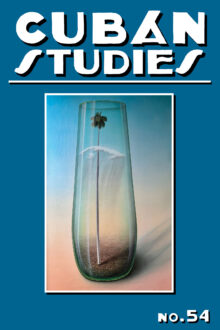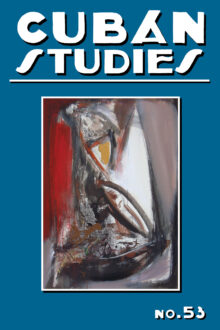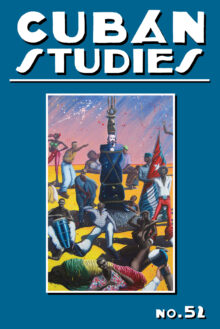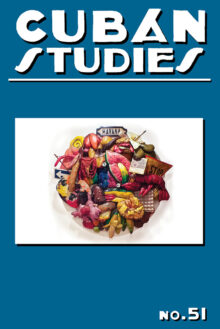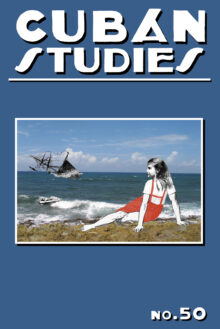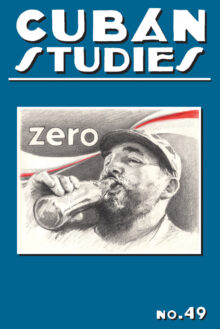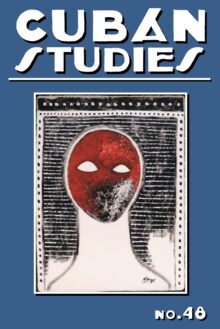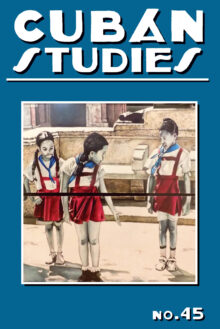

Alejandro de la Fuente
Alejandro de la Fuente is the Robert Woods Bliss Professor of Latin American History and Economics and professor of African and African American studies at Harvard University and director of the Afro-Latin American Research Institute in the Hutchins Center for African and African American Research. He is the author of Havana and the Atlantic in the Sixteenth Century and A Nation for All: Race, Inequality, and Politics in Twentieth-Century Cuba, and is the editor of Queloides: Race and Racism in Cuban Contemporary Art.
Cuban Studies 54
Cuban Studies is the preeminent journal for scholarly work on Cuba. Each volume includes articles in English and Spanish and a large book review section. In publication since 1970, and under Alejandro de la Fuente’s editorial leadership since 2013, this interdisciplinary journal covers all aspects of Cuban history, politics, culture, diaspora, and more. Issue 54 contains seven articles, a dossier on transition in Cuba, and two sections of primary sources.
Cuban Studies 53
Cuban Studies is the preeminent journal for scholarly work on Cuba. Each volume includes articles in English and Spanish and a large book review section. In publication since 1970, and under Alejandro de la Fuente’s editorial leadership since 2013, this interdisciplinary journal covers all aspects of Cuban history, politics, culture, diaspora, and more. Issue 53 contains twelve articles and two sections of primary sources.
Cuban Studies 52
Cuban Studies 51
Cuban Studies is the preeminent journal for scholarly work on Cuba. Each volume includes articles in English and Spanish and a large book review section. In publication since 1970, and under Alejandro de la Fuente’s editorial leadership since 2013, this interdisciplinary journal covers all aspects of Cuban history, politics, culture, diaspora, and more. Cuban Studies 51 includes a dossier on Cuban social history.
Cuban Studies 50
Cuban Studies is the preeminent journal for scholarly work on Cuba. Each volume includes articles in English and Spanish and a large book review section. In publication since 1970, and under Alejandro de la Fuente’s editorial leadership since 2013, this interdisciplinary journal covers all aspects of Cuban history, politics, culture, diaspora, and more.
Cuban Studies 50 includes dossiers on new challenges in the private sector and communities of digital media sharing, along with reviews of nearly twenty new books.
Cuban Studies 49
Cuban Studies 48
Cuban Studies is the preeminent journal for scholarly work on Cuba. Each volume includes articles in English and Spanish and a large book review section.
Cuban Studies 45
Cuban Studies is the preeminent journal for scholarly work on Cuba. Each volume includes articles in English and Spanish and a large book review section.
Cuban Studies 45 features two special dossiers: the first discusses the history and workings of the Cuban constitution and the need to revisit it along with civil and political rights; the second offers new perspectives on the history of health, medicine, and disease in Cuba, and views race as a factor in both infant mortality and tuberculosis from the early-to-mid twentieth century.
Additional essays discuss culture through poetry, higher education reform, the narratives of Lordes Casal, and filmmaker Jesus Diaz as an ‘unintentional deviationist.’ History is discussed vis-a-vis the radio politics of young Eddy Chibas, the slave abolitionist rhetoric of the Countess of Merlin, and the creole appropriation of Afro-Cuban dance and music to create sabor during the late nineteenth century.
Queloides
Race and Racism in Cuban Contemporary Art
Queloides catalogs an art exhibit on the persistence of racism and racial discrimination in contemporary Cuba. Despite the social transformations implemented by the Cuban revolutionary government since the early 1960s, racism continues to be a deep wound in Cuban society, one that generates countless social and cultural scars. In response to the official silence surrounding racial issues in Cuba, the twelve artists who participate in Queloides insist on the need to acknowledge and debate this social problem. This is the first time in post-revolutionary Cuba that the word “racism” has appeared in the title of an exhibition. The volume, which is bilingual in English and Spanish, includes several essays that analyze the work of these visual artists in the context of changes experienced by Cuban society since the 1990s, including the resurgence of racist attitudes and behaviors. “Queloides,” or “keloids,” are pathological, wound-induced scars. Although any injury may result in keloids, many people in Cuba believe that black skin is particularly susceptible to them. Thus the title evokes the persistence of racial stereotypes and the traumatic process of dealing with racism, discrimination, and racist violence. Alejandro de la Fuente and Elio Rodríguez Valdés co-curated the exhibit, which was originally hosted at the Wifredo Lam Center of Contemporary Art in Havana, Cuba, and transferred to the Mattress Factory in Pittsburgh, Pennsylvania.

